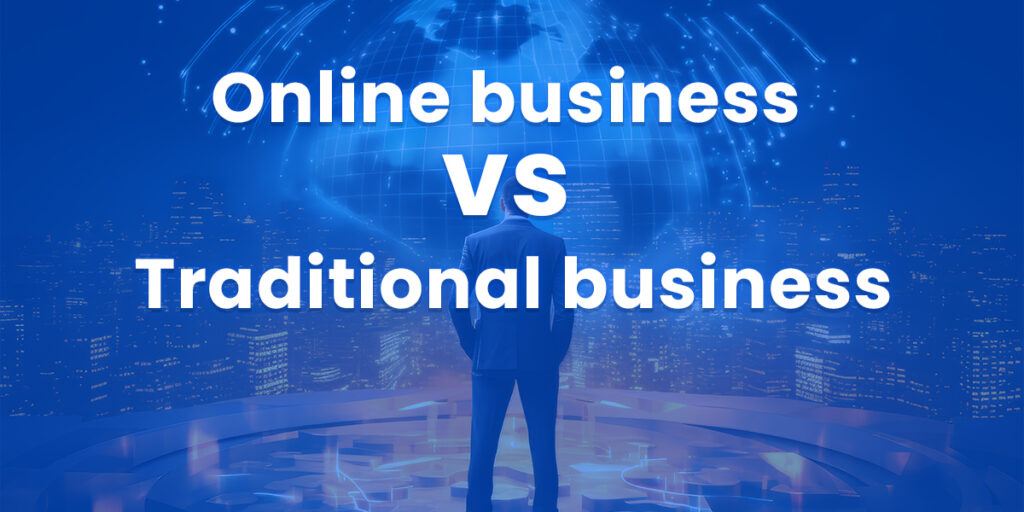If you want to remain competitive in the market then you have to update your business with the latest advancements. That’s why most of our traditional businesses transform into electronic businesses. But what are the main reasons behind this transformation? Is it compulsory for each traditional business to change into an e-business? And which business is more beneficial as we do the business to gain the maximum profit right? This debate is continuing in the market so let’s discuss some important facts of both businesses and answer all the queries that you have in your mind.
What is E-business?
Electronic or online business is a modern form of business that does not require any specific space or fixed time. This business is run through the internet without requiring any specific time. Online businesses utilize different digital platforms for marketing, sales, customer service, and more. Some examples of E-business include e-commerce stores, digital marketing agencies, and online service providers.
What is Traditional Business?
A traditional business usually has a physical presence, which usually include an office setup in a manufacturing facility, retail store, restaurant, agency, or other type of business. It attracts and retains clients through in-person encounters and traditional marketing strategies.
Difference between Online Business and Traditional Business
Aspect | Online Business | Traditional Business |
Location | Operates digitally, accessible from anywhere | Operates from a physical location, limited by geography |
Startup Costs | Generally lower, mainly technology and marketing expenses | Higher costs, including rent, utilities, and physical inventory |
Operating Hours | 24/7 availability | Limited to specific hours based on location and regulations |
Customer Reach | Global reach, wider audience | Local or regional reach, limited by physical presence |
Marketing | Digital marketing (social media, SEO, email) | Traditional marketing (print ads, local events, billboards) |
Inventory Management | Can use drop shipping or virtual products | Requires physical inventory and storage space |
Customer Interaction | Mostly virtual (emails, chats, video calls) | In-person interaction |
Scalability | Easier to scale quickly and expand globally | More challenging to scale, requires additional physical locations |
Overhead Costs | Lower ongoing costs (no physical rent, lower utility costs) | Higher ongoing costs (rent, utilities, maintenance) |
Speed of Transactions | Instant transactions and payments | Physical transactions can take longer (in-person payments, bank processes) |
Flexibility | Highly flexible, easy to adapt to market changes | Less flexible, harder to make rapid changes |
Technology Dependence | Highly dependent on technology and internet | Less dependent on technology, though increasingly important |
Security Concerns | Cybersecurity threats, data privacy issues | Physical security concerns (theft, vandalism) |
Customer Data Collection | Easier to collect and analyze customer data digitally | More challenging to collect and analyze data manually |
Environmental Impact | Generally lower (less physical infrastructure) | Higher (energy use, physical resources) |
Does Traditional Business Transform into Digital Business?
This question is very common: can you shift your traditional business into a digital business or not? And if you do that then will it be profitable for you or not? Now half of our business has already transformed into an online business that even most people think that it’s impossible. To encourage yourself you have real-time examples included:
Ride-Sharing:
In traditional business, we go to the road and book our cab, but this tendency has now extended to online businesses. A few examples are:
- Uber: A ride-hailing service that allows users to book cabs online through a mobile app.
- Lyft: Another popular ride-sharing platform that connects passengers with drivers via a mobile app.

E-Commerce:
We did not ever think that we would buy things on the internet. Traditionally, we take the headache of going to the market, dealing with the large crowds, and then wasting a lot of hours selecting the product according to our choice. And for groceries, we go to other marketplaces. This is a lengthy procedure that easily becomes simpler through online business and doesn’t even take up any of your valuable time. Examples include:
- Amazon: A global online marketplace where users can purchase a vast array of products, from books to electronics to groceries. Everything you get in one place that you have never thought about.
- eBay: An online auction and shopping website where people can buy and sell goods and services worldwide. Now the headache of getting international brands is also removed.
Food Delivery:
Food plays a significant role in our business. When we do traditional business, we travel to a certain hotel that may be distant from our house and have dinner there, but with internet business, the stress of making the drive is also eliminated. Through internet businesses, you can order food to enjoy in the comfort of your own home.
- DoorDash: A food delivery service that connects users with local restaurants for food orders and delivery.
- Grubhub: An online and mobile food ordering and delivery service.
Online Education:
Now let’s talk about education as this is also an important factor. Traditionally, if you wanted to get certified in a specific field, you would simply go to the right educational center and get the certification. Education is also undergoing change as well. Various online platforms consist of:
- Coursera: An online learning platform offering courses, specializations, and degrees in various subjects from top universities and companies.
- Udemy: An online marketplace for learning and teaching, with a vast selection of courses on various topics.
Digital Payments:
Since traditional methods of payment have also been converted to digital payments, traditional paper techniques are no longer necessary.
- PayPal: An online payment system that supports online money transfers and acts as an electronic alternative to traditional paper methods.
- Stripe: An online payment processing platform for internet businesses that allows them to accept payments and manage their business online.
Now you have fine examples in front of you who are very successful in their careers and earn more profit in a year than you may earn traditionally in two or three years on average. These are just a few examples. Whatever business you currently operate, you must have a good example of how to conduct it electronically.
Now the question that was raised in the starting was, is it compulsory for each traditional business to change into e-business?
No, not all traditional businesses need to convert to online business. But as the world moves more and more toward digital solutions, companies that adapt to this trend could experience increases in revenue and a competitive edge. By establishing an online presence, companies can enhance their reach, simplify operations, and use digital marketing tools to run more focused and economical campaigns. Making the switch to e-business is not required, but it may have a big impact on scalability, client involvement, and general corporate growth.

